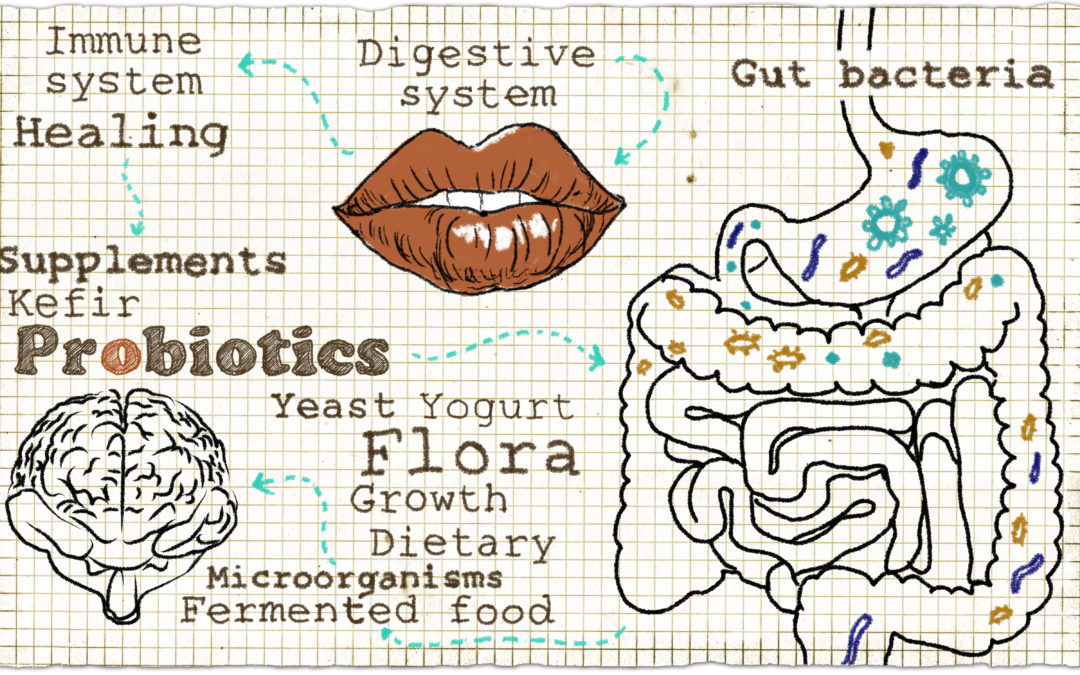Spring cleaning isn’t just for the home. It can also be for the mind and body.
As holistic health professionals, we have known for a while now that a healthy gut is a key component of a healthy body. If you’ve been feeling lacklustre and like your energy is low despite all your efforts, it might be a good idea to take steps towards improving your gut health this spring. Improving your gut health will also help in balancing your hormones, making you *feel* better (since the gut-mood connection has been largely discussed and proven), improve symptoms of poor digestion, and a lot more! ?
Here are a few steps to help you improve your gut health.
#1. Start With Probiotics
Your gut is full of good bacteria, but it also has bad bacteria. When the bad begins to outnumber the good, that is when you start to have problems. The good bacteria are known as probiotics and they break down food to extract the nutrients. They also generate enzymes that aid digestion and maximise absorption. Without probiotics, your body is unlikely to absorb what it needs to stay healthy. To fix this, you can take a quality time-release probiotic supplement, and you can also add various fermented foods to your diets, such as sauerkraut and kombucha.
#2. Boost Your Gut Barrier
The gut barrier is the intestinal wall and gut microbes, which function as a barrier between the bloodstream and the rest of the body. The gut barrier actually has an intelligent permeable design, which means that it allows nutrients to penetrate it while blocking toxins and bad bacteria.
However, if your gut is low on good bacteria, the gut wall also begins to fail and cause reactions like allergies and other immune problems. Support your gut barrier by consuming more indigestible fibres, also known as prebiotics. You can consume prebiotics in supplement form or by eating foods like jicama, avocado, soybeans, potato skins and organic apple cider vinegar. You can also supplement with L-glutamine to strengthen the gut wall further.
#3. Scrutinise Your Food Choices
The modern diet tends to be full of processed food, chemicals and sugar, which all cause chaos in the gut. Not only that but the food you eat, whether good or bad, can change your gut for better or for worse within only a few hours. Take time to pick your food carefully, and focus on whole foods, plant-based food and fermented food while shying away from sugar and chemicals.
In addition to that, I find it particularly helpful to understand if you do have some food intolerances that are affecting your digestion too. Food intolerances have smaller noticeable effects than food allergies, yet they can be affecting many aspects of your life. For example, if you suffer from one of the following items on the list (list not exhaustive) you could have food intolerances:
- Digestive distress (which is what we tackling in this article, notice how it’s one of the first symptoms I’m listing ? )
- Respiratory issues
- Rashes
- Water retention
- Acne
- Migraines
- Congestion
- Fatigue
- Irritability
- Brain fog
If you’re looking for help to identify your food intolerances, check out our comprehensive intolerances testing kit.
At the same time that you’re removing the foods that are not working for you, make also sure you’re chewing your food properly too. If you didn’t know, digestion starts in the mouth as the saliva is full of enzymes that start breaking the food down before they even reach your stomach. If you’re noticing that you have reflux or fermentation happening during the digestion process (a.k.a. gas and bloating), you might need to help you digestion a little bit. You can start by drinking a tall glass of water with the juice of half a lemon or one teaspoon of apple cider vinegar 20 minutes or so before starting your meal. It will help boost your body’s production of hydrochloric acid (which breaks down food in your stomach). Otherwise, to support your digestion further, look into adding some ox bile (for the breakdown of fat), some bitters (to support your liver and gallbladder) and some betaine HCL.
If you had your gallbladder removed, or are having gallbladder issues, I would recommend you do look into adding some ox bile as well.
#4. Try Fasting
Fasting doesn’t have to mean 24 hours drinking only water. In fact, intermittent fasting can be as simple as not eating after 8 PM at night and then not eating again until 8 AM the next morning. That’s 12 hours of not eating. This allows your gut to get back on track as the probiotics can rest and repopulate. Once you’ve mastered 12 hours, try increasing it to 14 by eating dinner early and not eating past 6 PM.
Taking these simple steps will help strengthen your gut and reduce inflammatory responses throughout your body.
Frequently Asked Question(s)
Which supplements do you recommend?
If you’re wondering which supplements I usually recommend for digestion, here is my personal list.
Additional Resources You Might Find Helpful From The Lotus Power Health Academia
Overcome Digestive Challenges
The process of digestion begins in the mouth, as chewing triggers the release of enzymes needed to break down foods into smaller molecules. In this course, we’ll discuss reasons why digestion may not function optimally, and how all other functions of the body can be negatively impacted as a result.
Break Free From Candida
Candida can cause lots of awful symptoms, from reoccurring yeast infections, dandruff, and eczema, to chronic digestive upset, cognitive impairment, and even depression. If you’ve been living with unexplained fatigue, digestive issues, fungal infections, or chronic sinus infections, candida overgrowth may be to blame! Through this course, you’ll learn what candida is, how it may manifest, and ways to address it. I’ll provide a list of foods to avoid to starve candida as well as a list of foods to help restore beneficial bacteria numbers.
FREE 10-Day Optimised Health & Wellness Challenge
Discover the 5 steps of The Optimised Health Formula and how you can apply them to your life.

